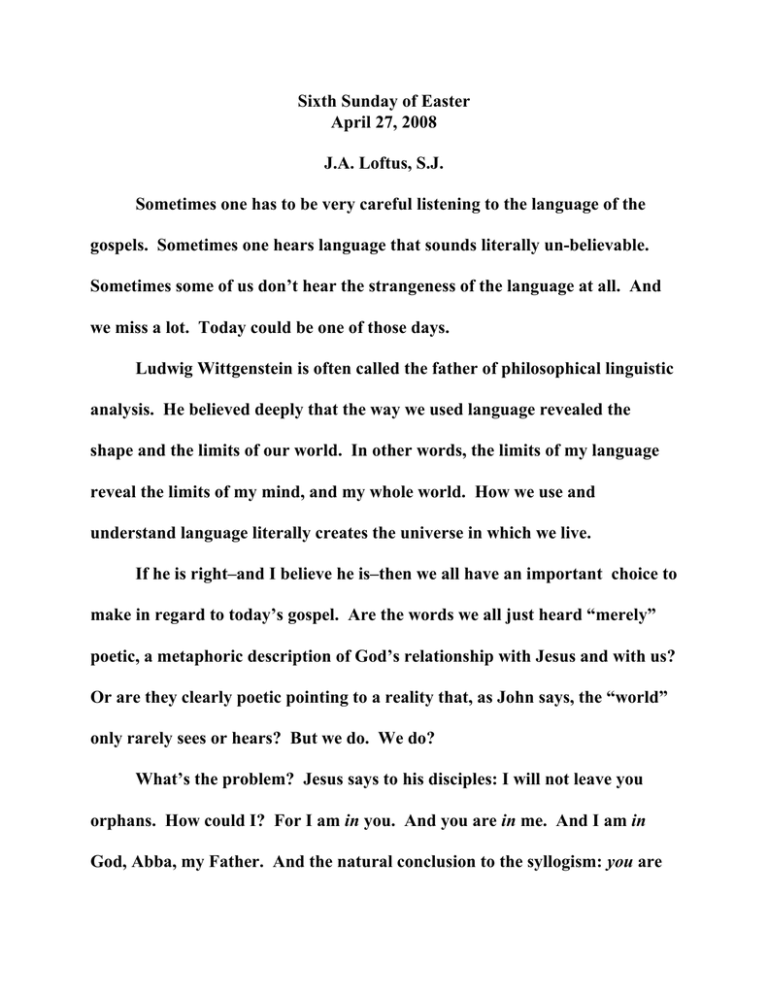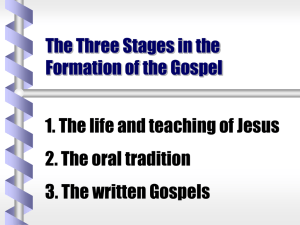Sixth Sunday of Easter April 27, 2008 J.A. Loftus, S.J.
advertisement

Sixth Sunday of Easter April 27, 2008 J.A. Loftus, S.J. Sometimes one has to be very careful listening to the language of the gospels. Sometimes one hears language that sounds literally un-believable. Sometimes some of us don’t hear the strangeness of the language at all. And we miss a lot. Today could be one of those days. Ludwig Wittgenstein is often called the father of philosophical linguistic analysis. He believed deeply that the way we used language revealed the shape and the limits of our world. In other words, the limits of my language reveal the limits of my mind, and my whole world. How we use and understand language literally creates the universe in which we live. If he is right–and I believe he is–then we all have an important choice to make in regard to today’s gospel. Are the words we all just heard “merely” poetic, a metaphoric description of God’s relationship with Jesus and with us? Or are they clearly poetic pointing to a reality that, as John says, the “world” only rarely sees or hears? But we do. We do? What’s the problem? Jesus says to his disciples: I will not leave you orphans. How could I? For I am in you. And you are in me. And I am in God, Abba, my Father. And the natural conclusion to the syllogism: you are in God with me. You could never be orphans! This is an astounding statement. Is it to be taken literally? Or is it metaphoric poetry? We need to be careful how we answer. There are other places in John’s gospel (and indeed in the other gospels) where what sounds like only metaphoric language, the Christian Catholic community has argued for centuries is pointing to an ultimate level of reality we only glimpse on occasion. But a level of reality in which we believe quite literally. For example, “unless you eat the flesh of the Son of Man and drink his blood, you will not have life in you.” Or “take and eat; this is my body broken for you and for the life of the world.” Few of us think Eucharist is “mere” poetry. So what about today’s astonishing assertion. Older translations were trapped not wanting to confuse the faithful. So many of them (probably the translations most of us grew up with) shifted part of Jesus’ saying. They have Jesus saying of himself and his father: I am in the father and the father is in me. So far, fine. But when it comes to the part about us, they subtly change the words to say: And you shall be with me. As if it refers to something coming in the future and a foretelling of an eventual accompaniment with Jesus, rather than an identity in him. I should know better than to get back into the tenses of verbs and the 2 use of prepositions in the scriptures, but this is a crucial distinction and one with many serious consequences for how you and I think of ourselves and our relationship with Jesus. “You shall be with me is not the same as you are in me.” It’s that simple. So which is it? The limits of my language reveal the limits of my world. What John actually has Jesus say in today’s gospel is a different way of seeing reality. But it is clear that John means this identification to be really real, not just metaphoric. “The world,” John tells us further, will never be able to comprehend or understand this reality. But we will. We are supposed to live in this new dimension of reality. Have we entered a theological Twilight Zone? Not necessarily. Not even the most die-hard empiricist sitting here today can say with integrity that reality is only what we readily see. Modern science knows just how bizarre the “real” world is. And the real world gets more and more curious with each passing year. Artists always seem to have an edge when it comes to describing deep levels of reality that many others never see. In her latest book of poems, Red Bird, Mary Oliver has red bird herself speak at the very end. “...I am both of the earth and I am of the inexplicable / beauty of heaven / where I fly so easily, so welcome, yes, / and this is why I have been sent, to teach this to your 3 heart.” The Holy Spirit, the Paraclete, the Advocate, that great fiery Dove, the white bird, whom we await at Pentecost, could hardly have said it better. Christian theologians have characterized the inner life of the Trinity as “perichoresis.” Perichoresis is a word for dance, a life-giving movement that goes round and round without beginning or end. This is the love and the life of the Father, and of the Son, and of the Holy Spirit. Jesus reveals again today that this Trinitarian dance is not for Divine persons only. We are all invited into the dance. We are the dance. And the dance is going on right now, right here, right beneath the surface of our worldly eyes. (John Shea) It is Easter! The limits of my language reveal the limits of my world, said Wittgenstein. Sometimes the language of the gospel seems un-believable; sometimes it is the foundation of believe. So we all have a choice today, a decision to make. Is this real? Or is it “just” poetry? Or is it, perhaps, both to eyes filled with Easter faith? Choose wisely. But remember the Easter mantra: Do not be afraid. I am with you always. I am in you always. I am the Advocate. Peace! 4






